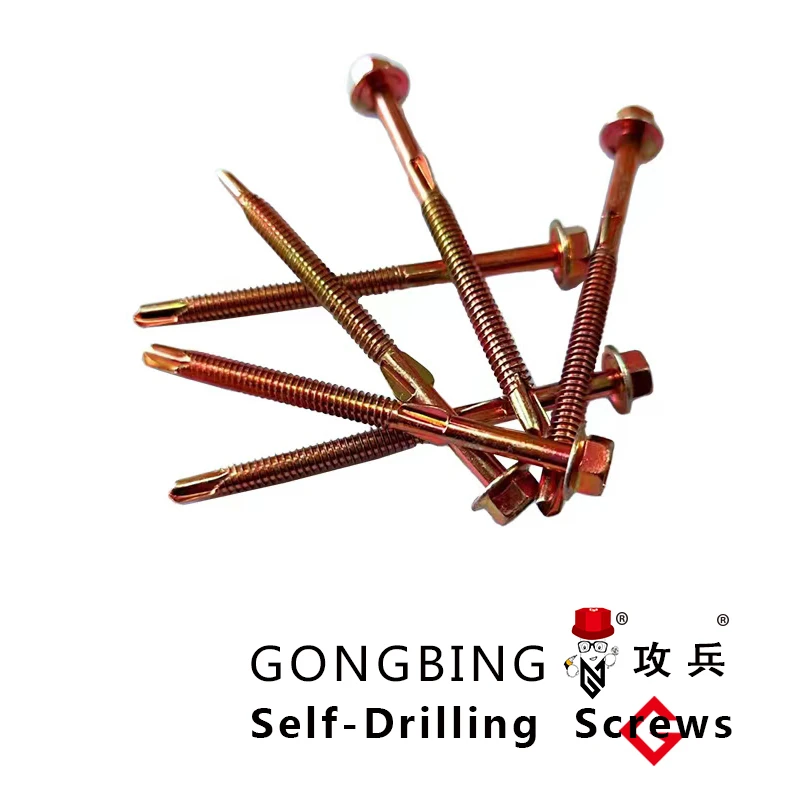hex head self tapping sheet metal screws
Understanding Hex Head Self-Tapping Sheet Metal Screws
When it comes to fastening materials, especially in construction and manufacturing settings, the choice of screw can greatly affect the durability and integrity of the assembly. Among the various types of screws available, hex head self-tapping sheet metal screws have emerged as a popular choice. Understanding their features, applications, and advantages can help you make informed decisions in your projects.
What Are Hex Head Self-Tapping Sheet Metal Screws?
Hex head self-tapping sheet metal screws are specialized fasteners designed to join metal sheets or components without the need for pre-drilling a pilot hole. They feature a hexagonal head that can be easily driven with a wrench or socket, providing excellent torque and grip. The self-tapping design allows the screw to create its own pilot hole as it is driven into the sheet metal, making installation quicker and more efficient.
These screws are commonly made from materials such as stainless steel, which offers corrosion resistance, or carbon steel, which can be coated for added protection against the elements. The choice of material typically depends on the application environment and the desired level of strength.
Key Features
1. Hexagonal Head The hexagonal shape enables the use of wrenches and power tools for insertion, which facilitates a more secure fastening compared to slotted or Phillips-head screws.
2. Self-Tapping Design The unique thread design allows these screws to cut through materials such as sheet metal and plastic, eliminating the need for extensive preparation time and additional tools.
3. Variety of Sizes and Threads Hex head self-tapping screws come in a wide range of sizes and thread patterns, making them versatile for various applications from HVAC systems to automotive assemblies.
4. Corrosion Resistance The materials used in these screws often include protective coatings, which enhance their durability in outdoor or high-moisture environments.
Applications
Hex head self-tapping sheet metal screws are used in numerous industries due to their versatility. Common applications include
hex head self tapping sheet metal screws

- Construction These screws are essential in attaching metal components in building structures, roofing, and siding installations
.- Automotive Manufacturing They are employed extensively in automobile assembly for securing body panels and other components.
- HVAC Systems In heating, ventilation, and air conditioning systems, these fasteners are used to install ductwork and other metallic parts.
- Home Improvement Projects DIY enthusiasts favor these screws for their ease of use, especially in tasks like attaching metal fixtures, fences, and automotive repairs.
Advantages
The use of hex head self-tapping sheet metal screws offers several advantages
- Time Efficiency Their self-tapping feature saves time during installation, eliminating the need for pre-drilling pilot holes.
- Strength With robust construction and the ability to penetrate thick materials, these screws provide a secure and lasting hold.
- Ease of Use The hex head design allows for easy torque application, reducing the risk of stripping the head during installation.
- Versatile Compatibility Suitable for a range of materials, including different gauges of sheet metal, plastics, and composites, these screws can be used interchangeably in various applications.
Conclusion
Hex head self-tapping sheet metal screws are an essential tool for anyone working with metal materials. Their self-drilling capability, strength, and ease of use make them a go-to choice for both professionals and DIY enthusiasts. Whether constructing a building, assembling vehicles, or tackling home improvement projects, these screws provide reliability and efficiency that can significantly enhance overall project outcomes. By understanding their characteristics and applications, users can leverage their benefits effectively, ensuring secure and long-lasting assemblies.
-
Weatherproof Plastic Expansion Anchors for OutdoorخبرونهJun.06,2025
-
Sustainability in the Supply Chain: Eco-Friendly TEK Screws ProductionخبرونهJun.06,2025
-
Load-Bearing Capacity of External Insulation FixingsخبرونهJun.06,2025
-
Double Head Bolts: Enhancing Efficiency in Industrial MachineryخبرونهJun.06,2025
-
Corrosion Resistance in Chipboard Screws: Coatings for Wholesale DurabilityخبرونهJun.06,2025
-
Butterfly Toggle Bolts : Enhancing Structural ResilienceخبرونهJun.06,2025
